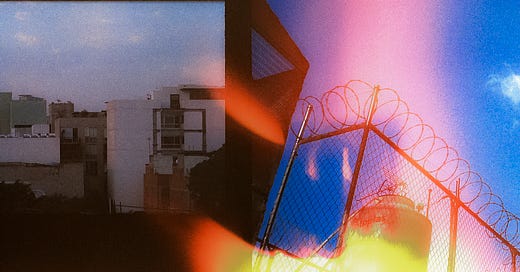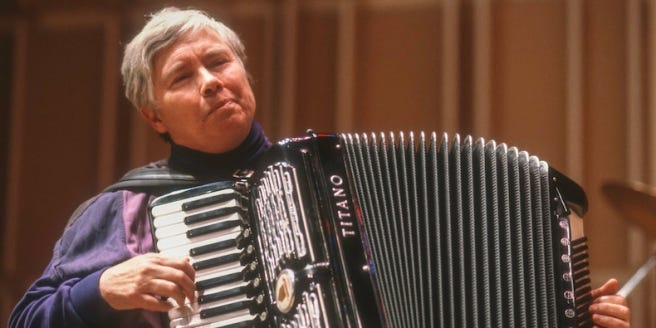Poetics of Place: Episode 4
Part 4 in my reflections on my current experimental place-based writing workshop
Tonight I am writing reflection number four of eight, thinking on and with my Poetics of Place experimental writing workshop hosted online this Winter with the YMCA of Central New York’s Downtown Writers’ Center. Each week, I reflect on the past week’s session as a practice of making public insights I’ve gathered through the workshop, sharing the genius of the participants, and advancing my own thinking around the idea of place-based poetics.
Last week, our workshop took a midway break. If my participants are anything like me, this pause was a welcome diversion: it allowed me to sit with what I’ve learned the past four sessions, and to focus on other parts of life that needed my attention. So, this post is dedicated to the session hosted on 13 February, 2025: Session 4 - Deep Listening.
Deep Listening
Deep Listening is a sound practice developed by Pauline Oliveros over the latter half of the 20th century. Oliveros, besides being a trailblazing practitioner of electronic music and queer icon, is well knowing for this full-body, intentional and creative protocol. The name “Deep Listening” is a bit of play on words: in 1984 Oliveros and fellow musician Stuart Dempster descended into a deep subterranean cistern in Washington state with a range of musical instruments, recording the reverberations and echos of the instruments they played. The otherworldly recordings were released as the EP “Deep Listening” by New Albion Records in 1989.
In a 2014 lecture, Oliveros spoke about how the experience changed her perception of not only the how of music making, but the where: the cistern became a collaborator to which Dempster and Oliveros couldn’t not attend. We ought to consider any space where sound happens, not just the cistern, as an important player in the creation of music, she asserts. How might I think about the sound that exists in my room as I type this (scattered percussion of clicking keyboard, roar of a descending airplane, car’s woosh, cricket’s chirp) as music?, I ask myself.
Oliveros developed Deep Listening over the following 30 years of her life, facilitating listening gatherings and performing experimental accordion around the world. This was only after she developed the first electronic music studio at any US university in the 1970s and spent a bulk of the 1980s studying buddhist and taoist meditation. There now exists the Center for Deep Listening, which continues to develop the sound practice after Oliveros’s death in 2016. A life’s work, we learned, is staged in several acts.
I remember hearing about Pauline Oliveros in the early years of my undergrad in Michigan — the cool, smart, and sexy students three years above me in my program were gabbing over the fact that this butch lesbian helped found what we know today as electronic music. That is, I heard about Oliveros, but I didn’t really listen. I had somehow allowed Oliveros to dwell in the back of my mind until summer 2024 when, at the second annual Queer Ecologies Research Collective, Tyna Onkto shared Oliveros’s Deep Listening practice and guided us through an incredibly elucidating and fun “extreme slow walking” exercise through Mildred’s Lane.
I find the distinction Oliveros makes between hearing and listening to be particularly insightful. In the book, she says “to hear is the physical means that enables perception, to listen is to give attention to what is perceived.” So, it’s the factor of attention that changes the score from one of passive to active reception. This makes me think of the poetry book Active Reception by Noah Ross, in which the author engages the form and structure of written language to “write from the bottom” and remake what it means to receive.
I began the last Poetics of Place session by starting directly with a listening activity, asking participants to listen to about 5 minutes of the Deep Listening EP. I had asked them to read the introduction to the book and listen to the full EP pre-session, so this activity served as our warm up. I then laid out the hearing vs. listening distinction and prompted the group to listen deeply to their surroundings, wherever they may have been, and write what they listened to. Since it’s been a real hard winter up in the Northeast US, where most of my participants live, a lot of the sounds that emerged had to do with snow: the crunch of tires impacting it, the whir of wind gusting it, the sound of it falling quietly. What does the sound of snow falling? This was something I hadn’t considered before, even though I’ve lived many real hard winters.
The deep listening activities we engaged with allowed us to tap into what one participant called the “latent frequencies” : the waves of sound that reverberate all around and through us that are not obvious or easily perceptible. Only the attention of listening allows us to gain the richness of intimacy with the sonic world around us and to which we belong.
Like any of the ideas or practices with which we are working in Poetics of Place, there’s not enough time to go into each in depth. We could literally hold all 8 sessions on the theme of Deep Listening or next week’s theme “détournement” (deturning). Because Poetics of Place is a theory-practice routed through eclectic motives, I see this workshop as more of an introduction to a series of ideas and skills for participants to choose from for their future explorations. I’m very pleased with the group’s openness to learning and trying new things, even those that might feel out of place.
This week’s session is on the idea of détournement, a practice initiated in the mid-20th century by the Situationist International often translated to “highjacking” or “rerouting.” I prefer a more literal translation: “deturning.” As we’ll see in this week’s workshop, deturning has to do with changing the way we see and engage with everyday commercialized images. More on this next week!
I love to read what you have to say about the ideas and words on my substack! Leave a comment or send me a direct message with the buttons below <3







